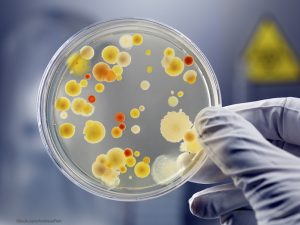Researchers at Rensselaer Polytechnic Institute (RPI) have found a way to kill Listeria and other pathogens without chemicals or antibiotics. Building on a method they developed to coat medical equipment with an agent that can kill antibiotic-resistant Staphylococcus aureus (MRSA), the researchers added lytic enzymes to nanoparticles of food-safe silica and to starch nanoparticles commonly used in food packaging.
 “In this study, we have identified a new strategy for selectively killing specific types of bacteria. Stable enzyme-based coatings or sprays could be used in food supply infrastructure—from picking equipment to packaging to preparation—to kill Listeria before anyone has a chance to get sick from it,” said Ravi Kane, RPI’s P.K. Lashmet Professor of Chemical and Biological Engineering, in a statement. “What’s most exciting is that we can adapt this technology for all different kinds of harmful or deadly bacteria.”
“In this study, we have identified a new strategy for selectively killing specific types of bacteria. Stable enzyme-based coatings or sprays could be used in food supply infrastructure—from picking equipment to packaging to preparation—to kill Listeria before anyone has a chance to get sick from it,” said Ravi Kane, RPI’s P.K. Lashmet Professor of Chemical and Biological Engineering, in a statement. “What’s most exciting is that we can adapt this technology for all different kinds of harmful or deadly bacteria.”
Listeria is a pathogen that, unlike other bacteria, can grow and thrive in cold temperatures. It is found in a variety of foods such as raw meats, vegetables and fruits, such as the cantaloupe Listeria outbreak of 2011. And in some foods that can become contaminated after cooking such as hot dogs, deli meats, deli salads and smoked seafood (from November through February large amounts of smoked salmon was recalled for possible Listeria contamination.) Listeriosis, the infection caused by a Listeria infection, has a 90 percent hospitalization ratecand more than a 15 percent mortality rate.
Bacteriophages are viruses that kill bacteria. They do so, by injecting their DNA into a bacterial cell and hijacking its replication system, so instead of forming new bacteria, the cell starts making virus. The lytic enzyme released as the initial hijacker dies, makes holes in the cell wall allowing all the newly minted viral cells to escape and repeat the process on other unsuspecting bacteria.In nature, lytic enzymes are used to break out of bacterial cells, BPI researchers discovered how to use them to break in, said Jonathan Dordick, vice president for research and the Howard P. Isermann Professor at Rensselaer, who helped lead the study.
In addition to Dordick and Kane, the research team also included Linda Schadler, the Russell Sage Professor and associate dean for academic affairs for the Rensselaer School of Engineering. The study was supported with funding from Sealed Air Corporation. The results were published in the paper “Enzyme-based Listericidal Nanocomposites,” which appears in the current issue of the journal Scientific Reports.





I’m encouraged to hear that researchers are finding ways to HELP prevent food poisoning, however the food employees are still going to have to handle the food in a safe manner. It would be of great benefit if food employees were paid better, given paid sick leave and education. Everyone needs to realize that handling food is dangerous and puts lives at risk and not everyone knows how to handle food safely or cares to do so.
I really hope that is not made using cornstarch. If so, those of us who are allergic to corn or sulfites won’t be able to eat foods that are packaged using it. We don’t want to get listeria or other deadly food poisoning. But, we don’t want to have severe allergic reactions that can sicken or kill us, either. Wouldn’t it be better to make the food industry provide safe, uncontaminated foods for us, in the first place? That sounds like a much better solution to me. Maybe it’s too much of a common sense approch, for them to grasp.